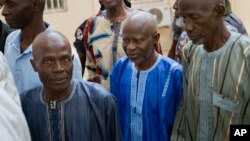A Gambian court has ordered the release of an opposition leader and 18 other political prisoners, just days after President Yahya Jammeh lost the recent presidential election and agreed to step aside.
Ousainou Darboe and other members of the United Democratic Party received three-year jail sentences in July for taking part in a peaceful demonstration demanding electoral reforms. The court's decision Monday to release them on bail prompted cheers in the courtroom and among supporters outside.
Another opposition party is asking the international community to ensure all political prisoners jailed under Jammeh are quickly released.
“By this interview, I’m calling on Amnesty International, Human Rights Watch, and also the United Nations Commission on Human Rights for them to intervene and make sure that these political prisoners are released immediately," said Saihou Mballow, one of the Diaspora coordinators for the Gambia Democratic Congress party.
According to Amnesty International, at least 51 people arrested this year alone are awaiting trial, including Darboe. Thirty-six others are being held without charges.
"The Gambian people have spoken. They have called for the release of these people. That’s why they voted Jammeh out,” Mballow said.
Newly-elected leader Adama Barrow has said he wants to be the president for all Gambians. He also said one of his priorities is to create jobs, particularly for the country’s youth.
Mballow said the new coalition government faces challenges in that it will have to rebuild every aspect of Gambian society, following Jammeh's 22-year rule.
“During his time in office, there was no respect for the rule of law. The civil service is in shambles right now. The health sector has failed; the security has failed. At this moment, we don’t think whether we have a professional army that can maintain security for the Gambian people because all they were doing was they were answerable to President Jammeh,” Mballow said.
He also said Jammeh was in charge of almost every government ministry, effectively controlling the lives of Gambians.
“He was the man who was in charge of the health sector; Jammeh was the one who was in charge of the agriculture sector; Jammeh was the one who was in charge of the finance sector; Jammeh was the one who was in charge of the business sector. So, this coalition has a big problem,” he said.




